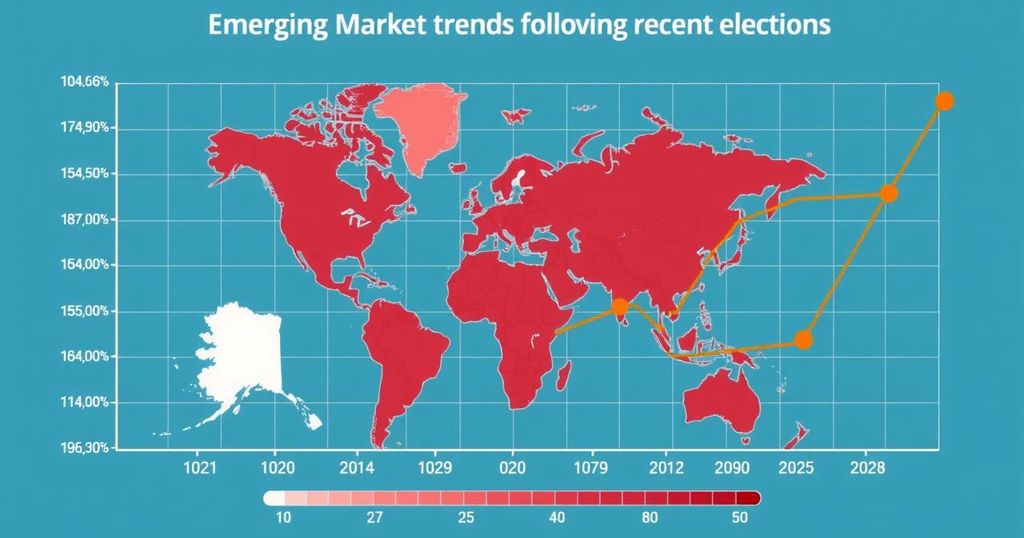As Donald Trump prepares for his presidency, financial markets are shifting their focus to his anticipated economic policies. Investor optimism centers around tax cuts and deregulation, although trade war threats contribute to market uncertainty. The U.S. economy exhibits resilience, while companies like Eaton and Caterpillar are well-positioned for growth. Nonetheless, potential risks from tariffs loom, necessitating a disciplined investment approach.
As Donald Trump prepares to be inaugurated as the 47th President of the United States, financial markets are adjusting their outlook to accommodate the prospective policies his administration may implement. Historically, the U.S. stock markets have exhibited robust performance regardless of the political party in power. However, current investor optimism hinges on anticipated tax cuts and deregulation, juxtaposed with fears concerning tariffs and potential trade conflicts, which have created a backdrop of uncertainty that could impact corporate profitability, economic growth, and overall market stability.
The U.S. economy demonstrates considerable resilience, with a predicted fourth-quarter GDP growth of approximately 2.7%. Employment figures remain robust, while manufacturing activity shows signs of improvement. Corporations such as Eaton PLC, a leading manufacturer of power equipment, and Caterpillar, a worldwide construction equipment supplier, are reaping the benefits of strong results and positive market sentiment. These firms are well-positioned for sustained growth, especially in light of infrastructure investments and a regulatory landscape conducive to industrial demand.
Nevertheless, substantial risks remain. President-elect Trump’s proposal of a 25% tariff on imports from Mexico and Canada has sparked concerns regarding potential disruptions in supply chains and inflationary pressures. Although these tariffs could adversely affect certain manufacturers, there is a belief among some observers that they are primarily negotiation strategies aimed at enhancing American production capabilities. Companies with a strong domestic focus are likely to be more resilient against these challenges. Moreover, organizations like Eaton and Caterpillar possess experienced management teams adept at navigating the complexities of trade fluctuations.
Successful navigation of the post-election market landscape necessitates a disciplined value-investing approach. Holding stocks characterized by solid fundamentals, favorable valuations, and dependable dividends remains essential for long-term investment success. Historical trends indicate that value stocks typically outperform during periods of economic transition. Warren Buffett aptly noted, “Long-term bets against America are seldom wise,” underscoring the prevailing sentiment in the current investment climate.
The upcoming 2024 election heralds a new economic phase replete with both challenges and opportunities. By adopting a diversified investment portfolio and maintaining a long-term perspective, investors can take advantage of the evolving market dynamics effectively. It is crucial to remain focused, disciplined, and actively invested during this transformative period.
The article reflects on the transitional economic landscape as Donald Trump assumes the presidency, emphasizing the implications this may have on financial markets. It outlines the historical resilience of U.S. stock markets, which tend to thrive amidst political power shifts, while also discussing the specific factors that are shaping current investor sentiments. The potential influence of Trump’s proposed economic policies, such as tax cuts and tariffs, on corporate earnings and economic growth is analyzed, alongside the performance of major corporations positioned to benefit from these changes.
In conclusion, the economic landscape following the upcoming election presents both opportunities and risks for investors. The anticipated policies of the Trump administration may lead to significant shifts in market dynamics, although the historical performance of U.S. stocks offers a degree of optimism. A strategic emphasis on value investing, coupled with a focus on resilient companies like Eaton and Caterpillar, may prove advantageous in navigating this new era. Ultimately, maintaining a disciplined investment approach will be crucial for achieving long-term financial success amid changing economic conditions.
Original Source: www.forbes.com







